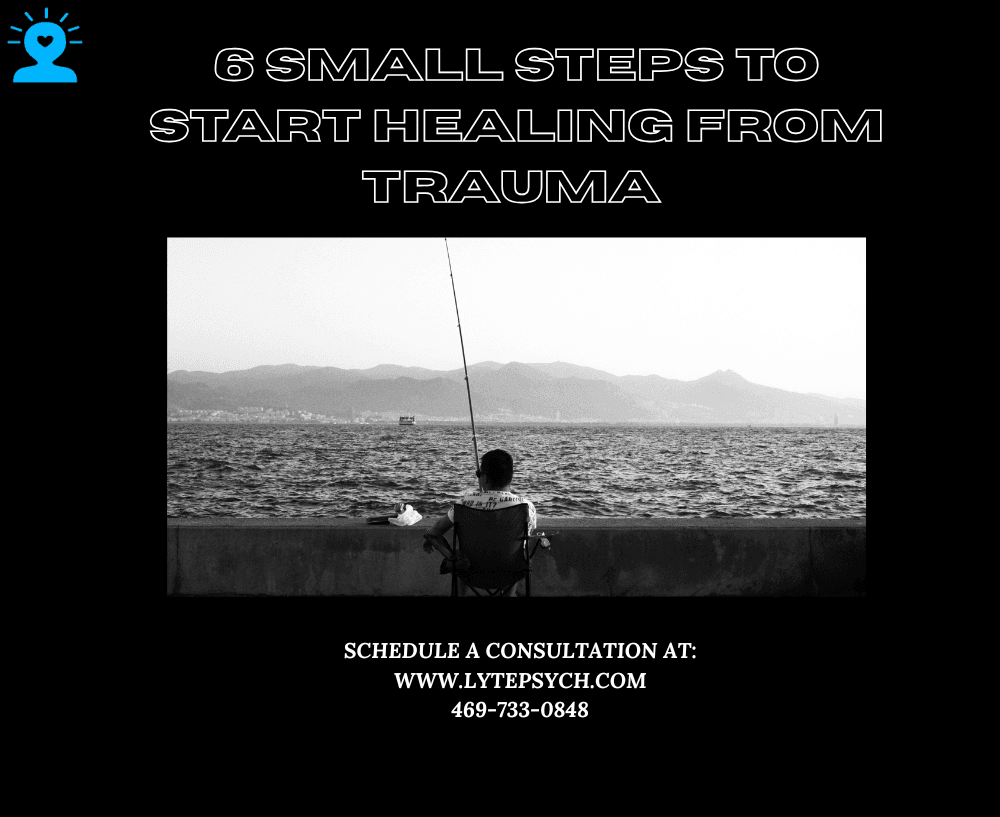Fri Jul 25 2025
6 Small Steps to Start Healing from Trauma at Lyte Psychiatry, Best Adults and Adolescents Therapist and Psychiatrist Near You (Affordable Therapist and Psychiatrist Near You) Dallas & Arlington, TX.

6 Small Steps to Start Healing from Trauma
Compassionate Care at Lyte Psychiatry – Best Adults and Adolescents Therapist and Psychiatrist Near You (Affordable Mental Health Services in Dallas & Arlington, TX)
At Lyte Psychiatry, we support adults and adolescents in Dallas and Arlington, TX on their journey to healing. Our approach combines expert psychiatric care with therapy designed to treat trauma at its root.
What Is Trauma?
🔹Neglect or abandonment
🔹Car accidents, violence, or natural disasters
🔹Loss of a loved one
🔹Bullying or toxic relationships
6 Small but Powerful Steps to Begin Healing from Trauma
You don’t have to “fix everything” overnight. Healing is not linear — and it starts with manageable, meaningful actions.
✅ 1. Acknowledge That What You Experienced Was Real
Many trauma survivors minimize their experiences (“It wasn’t that bad,” or “Others have it worse”). But validating your own pain is the first step in recovery.
🔹 You are allowed to acknowledge that something hurt you — even if no one else saw it.
✅ 2. Start with Safety
🔹Creating a calming nighttime routine
🔹Avoiding triggering environments
🔹Establishing physical boundaries in relationships
Safety — emotionally and physically — is the foundation of trauma recovery.
✅ 3. Learn to Tune In to Your Body
Trauma often disconnects us from our body. Begin noticing your physical sensations:
🔹Do certain places or people make your heart race?
🔹Do you feel tension in your chest or stomach when you’re anxious?
Practices like deep breathing, gentle stretching, or yoga can help rebuild the mind-body connection and reduce dissociation.
✅ 4. Challenge Negative Self-Beliefs
Trauma often leaves behind harsh inner narratives:
🔹“I’m broken.”
🔹“It was my fault.”
Work to identify and gently question these beliefs. You can write them down and reframe them
✅ 5. Find a Supportive Therapist or Psychiatrist
🔹Provide a safe space to process your experience
🔹Teach coping strategies for triggers and flashbacks
🔹Help manage co-occurring conditions like anxiety, depression, or PTSD
🔹Offer medication support when needed
At Lyte Psychiatry, our team of clinicians is trained in evidence-based trauma treatments like Cognitive Behavioral Therapy (CBT), EMDR, and trauma-focused therapy for adolescents.
✅ 6. Celebrate Small Wins
Healing doesn’t always look like a big breakthrough. Sometimes it’s:
🔹Saying “no” for the first time
🔹Sleeping through the night
Recognize your progress — even if no one else sees it. Every small win builds momentum toward emotional resilience.
Trauma in Teens: What Parents Should Know
Teens process trauma differently than adults. Warning signs may include:
🔹Isolation or withdrawal
🔹Angry outbursts
🔹Risk-taking behavior
🔹Difficulty focusing in school
At Lyte Psychiatry, we provide compassionate care tailored to adolescents and offer support for parents as part of the healing process.
Seeking Mental Health Support at Lyte Psychiatry by Telehealth Services (Best Adults and Adolescents Psychiatrist Near You)
Healing from trauma doesn’t happen overnight, but every small step you take brings you closer to peace, stability, and self-understanding. Whether you're dealing with long-buried experiences or fresh wounds, the path forward starts with acknowledging your pain — and knowing that help is available.
To schedule an appointment. Click Here
To see our services. Click Here
Call us if you have questions at 469-733-0848
Frequently Asked Questions (FAQ)
Q: How do I know if I’ve experienced trauma?
A: Trauma is defined by its emotional impact, not just the event itself. If something caused ongoing distress, fear, or emotional disruption — it may be trauma.
Q: Is medication necessary to treat trauma?
A: Not always. Many people benefit from therapy alone. However, medication may be helpful for managing symptoms like anxiety, panic attacks, or depression.
Q: Do you treat teenagers with trauma?
A: Yes. We specialize in adolescent psychiatry and provide family support as part of the treatment process.
Q: How long does trauma treatment take?
A: Healing timelines vary. Some see improvement in a few months; others benefit from longer-term support. We tailor treatment to your unique needs.